
A new review of research evidence has explored the key differences in how women and men sleep, variations in their body clocks, and how this affects their metabolism.
Published in Sleep Medicine Reviews, the paper highlights the crucial role sex plays in understanding these factors and suggests a person’s biological sex should be considered when treating sleep, circadian rhythm and metabolic disorders.
Differences in sleep
The review found women rate their sleep quality lower than men’s and report more fluctuations in their quality of sleep, corresponding to changes throughout the menstrual cycle.
“Lower sleep quality is associated with anxiety and depressive disorders, which are twice as common in women as in men,” says Dr Sarah L...
Read More









Recent Comments